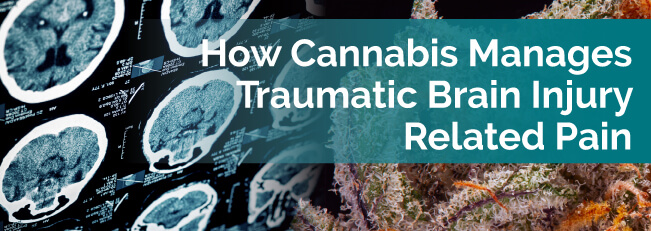
The initial cause of a traumatic brain injury (TBI) is quite apparent — a blow has occurred to the head and caused a brain injury. The repercussions of this event vary, depending on whether the TBI is mild, moderate or severe. One of the most common side effects of an injury to the head is pain. Most patients with TBI suffer from a headache, but other bodily pain can develop and impair the patient’s quality of life.
The majority of TBI patients who complain of pain are those with mild cases. This may be because those with moderate or severe TBI are unable to communicate the presence of pain because of cognitive impairments.
Treating a TBI patient begins with ensuring they survive the traumatic event. But it’s also important that they live happy and healthy lives free from pain. Cannabis is being explored as a possible treatment for TBI patients for several different reasons. One way it can help is by letting patients live pain-free lives, allowing them to recover fully from their injury.
Traumatic brain injuries can be caused by many different events, so the cause of pain varies. The discomfort could be due to bodily injury occurring at the same time as the head injury, such as during a car accident or fall. Or it could be nerve pain — or neuropathic — caused by damage to neural function.
About 90 percent of traumatic brain injuries are accompanied by a headache early on, and 44 percent of patients still have headaches six months after the event. The truth is, pain can occur at any time after a TBI. But headaches aren’t the only type of pain caused by a traumatic brain injury. Other types of pain that could result include:
Every patient is different, which means an individualized approach to pain management should always be worked out between the doctor and patient.
Most traumatic brain injuries are mild and can be treated with over-the-counter pain medications. However, even mild TBIs can cause severe pain. This type of pain is referred to as intractable, or difficult to manage, and can become a chronic symptom.
The most common treatment options for chronic and intractable pain are prescription medications or opiates. These heavy-duty meds help patients manage pain, but unfortunately, they can lead to many unwanted adverse side effects like memory problems or sleepiness. TBI patients are especially susceptible to these and other cognitive side effects. Prescription pain drugs are also highly addictive, and many patients find themselves getting hooked on pain pills.
Medical marijuana is viewed by many in the medical community as a positive, effective substitute for prescription pain medication. Cannabis is an analgesic — or a natural pain reliever — that works with our body’s endocannabinoid system to calm flare-ups of pain.
Two compounds present in marijuana, CBD and THC, bind with neural receptors to bring relief fast. Whether its nerve pain or the unpleasant side effects of the TBI, medical marijuana dulls the pain. It also allows patients to live their lives without the sedative effects of many prescription opioids. If you wish to avoid “getting high,” choose a strain high in CBD, as this compound is non-psychoactive.
It’s crucial to out your pain management plan with your doctor. Our advice shouldn’t replace their opinion, as they will know the specifics of your condition. For more information about getting your medical marijuana card or to discuss strain options, contact a medical marijuana-certified doctor or local dispensary.
For more information about how cannabis can be used to treat Traumatic Brain Injury, check out our resources: